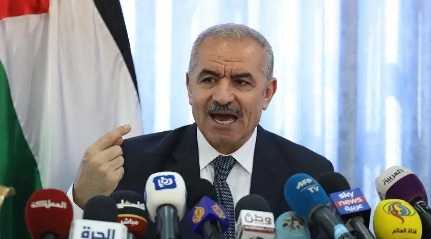
28 Nov 2022; MEMO: The Palestinian Prime Minister, Mohammed Shtayyeh, accused, on Sunday, Israel of stealing 600 million cubic meters of Palestine's 800 million cubic meters and diverting it into its cities and settlements.
Shtayyeh made the remarks at the Fourth Arab Water Conference organised by the State of Palestine under the title "Arab Water Security for Life, Development and Peace".
Shtayyeh said two-thirds of the Palestinians' groundwater in the West Bank is used inside Israel, explaining that an average Israeli consumes 430 litres of water per day, while a Palestinian only consumes 72 litres, much less than the global average of 120 litres.
"We are fighting for our water rights, and this conference is an eye-opener for more Arab cooperation in the water sector," Shtayyeh said, explaining that the Palestinian government is implementing a "water harvesting strategy", and has launched a dam project in Wadi Al-Far'a, as well as working on building huge water desalination projects in Gaza, funded by the European Union and other donors.
The Prime Minister explained that his government, since assuming its duties 3.5 years ago, has invested about $500 million in water and sanitation projects, thanking international partners for financing this "strategic sector".
Shtayyeh warned that the Dead Sea is threatened with complete drought by the year 2044, because of the Israeli measures against it, including diverting its water resources and depleting its capabilities, including minerals and salts that are extracted by Israeli companies.
"Water in the Arab world is a political and economic issue that needs a strategic vision … and our country is facing a real challenge regarding the scarcity of its water resources and theft," he said.
Shtayyeh explained that water is a major component in the Palestine-Israel conflict, adding that the Israeli agricultural settlements aim to control water resources from an early stage.
"Despite the importance of technological solutions to the water crisis, it is not a substitute for the realisation of water rights based on international law, in order to meet the gap between the availability of water resources and the growing need with an increasing population," he added.




